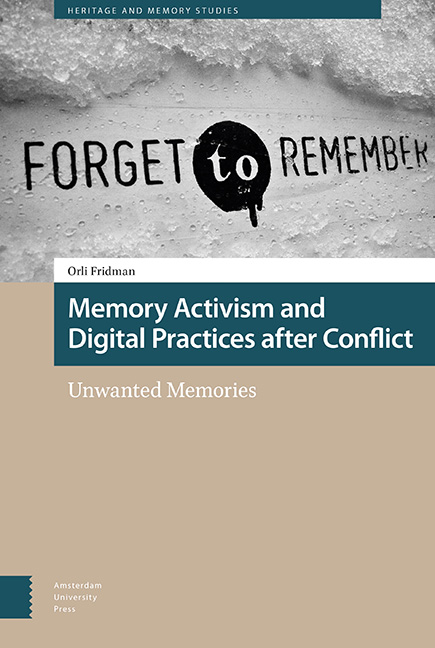Book contents
- Frontmatter
- Table of Contents
- List of Figures
- Preface
- Acknowledgements
- Introduction: Memory Activism and Alternative Commemorative Practices after Conflict
- 1 Unwanted Memories of (the Wars of) the 1990s
- 2 ‘Not in My Name’: From Anti-War to Memory Activism: The First Generation
- 3 ‘Too Young to Remember, Determined Never to Forget’: The Second Generation
- 4 Hashtag Memory Activism: Digital Memory Practices and Online Commemorations
- 5 Regions of Memory: The Post-Yugoslav Space as a Region of Memory Activism
- Epilogue: Unwanted Pasts in an Unresolved Present
- Appendices
- Bibliography
- Index
5 - Regions of Memory: The Post-Yugoslav Space as a Region of Memory Activism
Published online by Cambridge University Press: 07 October 2022
- Frontmatter
- Table of Contents
- List of Figures
- Preface
- Acknowledgements
- Introduction: Memory Activism and Alternative Commemorative Practices after Conflict
- 1 Unwanted Memories of (the Wars of) the 1990s
- 2 ‘Not in My Name’: From Anti-War to Memory Activism: The First Generation
- 3 ‘Too Young to Remember, Determined Never to Forget’: The Second Generation
- 4 Hashtag Memory Activism: Digital Memory Practices and Online Commemorations
- 5 Regions of Memory: The Post-Yugoslav Space as a Region of Memory Activism
- Epilogue: Unwanted Pasts in an Unresolved Present
- Appendices
- Bibliography
- Index
Summary
Abstract
In this chapter, the post-Yugoslav region is approached as a ‘region of memory’, to gain broader insights into the dynamics of regional memory politics. Despite the prevalence of ethnonational forms of engagement with the legacies of the 1990s in post-Yugoslav states, this region of memory features emerging platforms where activists claim agency through alternative counter-memories, and where civic engagement is growing and joint action is evolving. Regions of memory advance our understanding of memory activism by transcending the national, facilitating the articulation of regional mnemonic claims, beyond ethnicity. By allowing for agency in various forms and establishing networks for commemorative solidarity, the actions of memory activists from below position the post-Yugoslav region as a ‘region of memory activism’.
Keywords: region of memory, region of memory activism, post-Yugoslav states, commemorative solidarity
It was in the summer of 2020 when the plan of Belgrade city authorities to rename a number of streets was announced by Deputy Mayor of Belgrade Goran Vesić, who said that a majority of streets currently recalling places where ‘Serbia is not respected’ – especially locations in former Yugoslav republics – were set to be changed (Stojanovic 2020). Vesić declared that Belgrade should no longer name streets for ‘areas where everything reminiscent of Serbianness has been erased’ (Stojanovic 2020; Danas 2020). Efforts such as this to obliterate traces and legacies of the socialist Yugoslav past, undertaken over the last three decades across the region, are clearly still ongoing; and changes to street names and urban spaces represent just one manifestation of this process. Against this trend, however, research has shown that many who trace their roots in Yugoslavia engage with that socialist past not just in the context of how they or their families used to live, but rather, how they want to live now (Balunovic 2020). For some, looking backwards, Yugoslavia remains the symbol of a ‘normal’ life (Spasić 2012); but for some, looking forwards, it is a symbol of the potential for a better future (Palmberger 2008).
While the focus of this book is on the analysis of memories from the decade after Yugoslavia dissolved, this analysis inevitably addresses processes of continuation and change related to engagement with and the existence of the socialist Yugoslav past as a political phenomenon.
- Type
- Chapter
- Information
- Memory Activism and Digital Practices after ConflictUnwanted Memories, pp. 161 - 196Publisher: Amsterdam University PressPrint publication year: 2022

